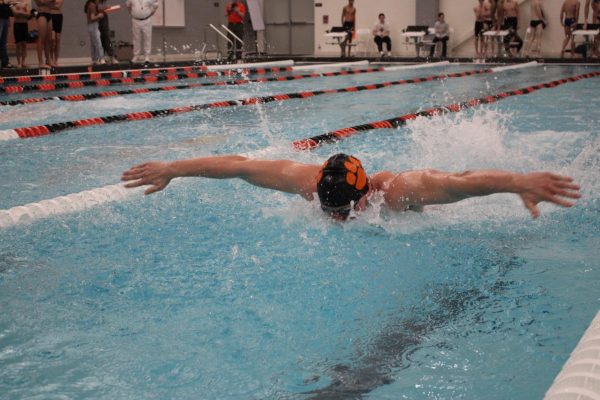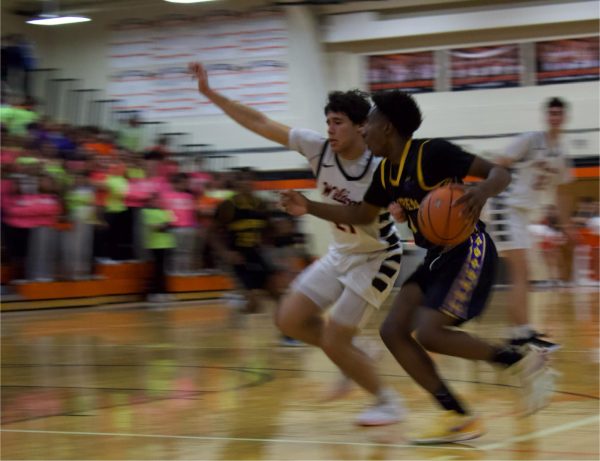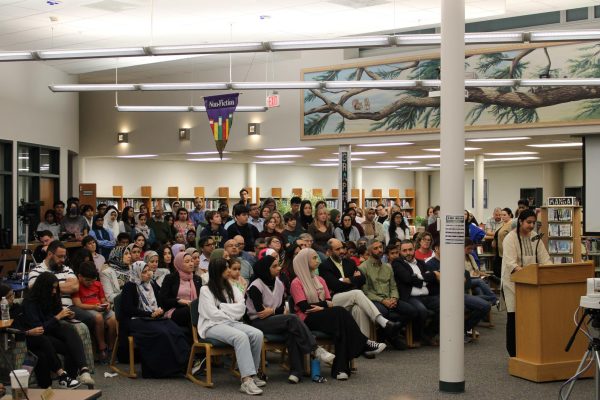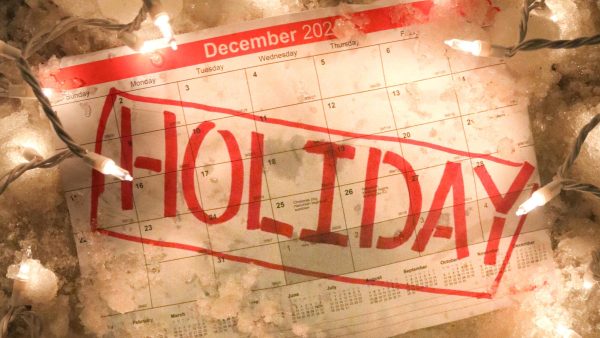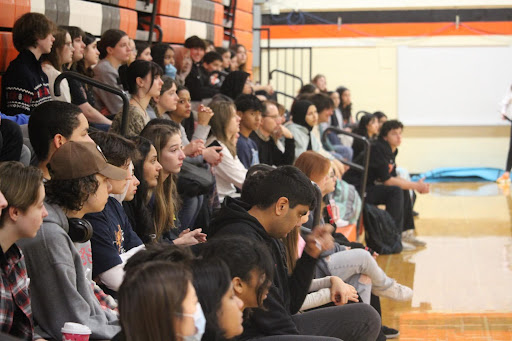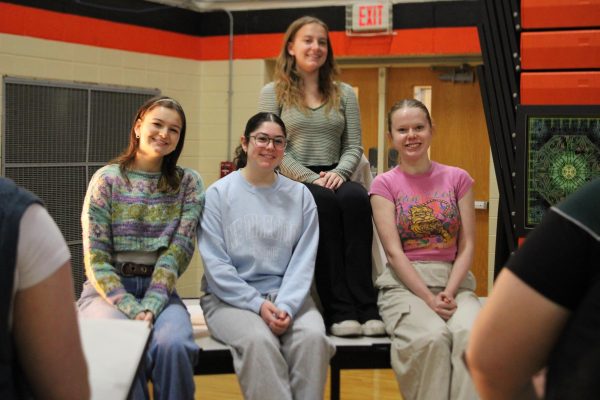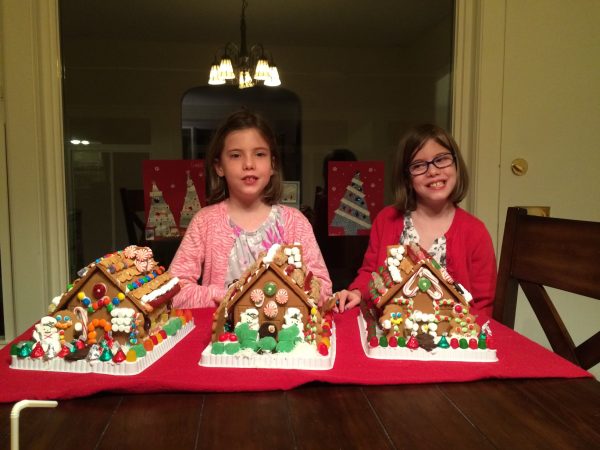LHS students put on production of “The Laramie Project”
On April 20 and 21, the LHS Theater Department performed “The Laramie Project” in the auditorium. The play, written by Moisés Kaufman and members of the Tectonic Theater Project in 2000, was in reaction to the 1998 murder of a gay student, Matthew Shepard, at the University of Wyoming in Laramie, Wyoming. The murder was a hate crime that exposed the lack of hate crime laws in many states, including Wyoming.
The play is composed of hundreds of actual interviews from townspeople, journal entries and published news reports. The LHS version had three acts (there was an intermission between acts I and II) and 24 actors portraying more than 64 characters. In order to give more LHS students the opportunity to participate, more actors were included than the original production, which had eight.
I was extremely impressed with the versatility of each and every actor, especially junior Julia DeNoia, since they had to fluidly switch characters in a matter of moments. Each transition was smooth and seemed effortless after nearly two months of preparation for “The Laramie Project.” Many aspects of the play included synchronized lines by many actors, along with synchronized sound effects made by claps or chairs, showing the hard work and diligence of the cast and crew.
“This is not a play about being gay; it’s about being targeted, hurt, murdered for being different, or perceived to be different, whatever that difference may be — and how this affects the community,” said Mr. Christopher Thomas, LHS theater teacher and director for “The Laramie Project,” in the director’s note.
“The Laramie Project” is a heavy topic to recreate, especially for a high-school production, and I was astonished by the maturity level and grace that was demonstrated in this play. The passion from each actor, and the message to end of hate, was felt in the air with every word that left their mouths. They believed in every word they said and truly meant it.
“I think the message of this play is a lot more powerful than others. It shows you that hate isn’t okay, and even if you might not agree with what others agree with, that doesn’t mean you can’t get along. It also doesn’t mean your opinions can’t change,” said sophomore Sayre DeBruler, the assistant stage manager, over email.
The “Erase Hate” campaign has recently started at LHS, inspired by “The Laramie Project. As part of this campaign, booths from clubs supporting the play and its message were located outside the auditorium; the clubs and organizations featured were the Gay Straight Alliance, Advocats, LHS United, Students Ending Slavery, Best Buddies, Green Dot, the Islamic Federation Network, and PFLAG.
The play began with dozens of pairs of shoes sitting on stage. Wearing jeans and a white shirt, each member of the cast then emerged from backstage stepping into the shoes, symbolizing the growth of perspective in the town of Laramie and the others that were impacted. This was repeated at the end of the play as well. Kaufman’s original stage directions did not include so many shoes, it featured only one lone pair, but Mr. Thomas adapted this for LHS’s production.
“I would say this show has a lot of heavy topics that aren’t usually addressed in other shows that LHS has put on, so I think it is important to recognize hate and homosexuality and stuff like that that people may not be very open to talking about. So I think it is really interesting that we are showing that to the audience,” said sophomore Jason Sekili.
Many times throughout this play, the audience was completely silent, totally immersed in the presence of the cast of “The Laramie Project.” Right before intermission, sophomore Gracie Benson played a doctor at the hospital Shepard was checked into. She provided a detailed description of Shepard’s body after the attack. I had goosebumps listening to her sorrowful explanation of the horrific acts against Shepard. The audience was left in awe before the second and third acts soon continued.
Somber feelings extended through the trials of the two men who killed Shepard. Additionally, his funeral made many audience members tear up as Shepard’s father, Dennis Shepard, portrayed by freshman Drew Benoit, displayed intense emotions as he mourned for his son. His statement, where he said he did not want one of the men on trial to have the death sentence so he could think about Shepard for the rest of his life, was breathtaking; it was so powerful and caused the entire auditorium to drop silent.
Some comedic relief was scattered throughout the play, lightening the mood from many of the sorrowful moments. For example, one of senior Michael Graham’s characters created laughs among the audience.
Overall, the play left the audience in disbelief from the outstanding performance of “The Laramie Project.”
“This show is full of moments that make my heart swell with pride. I am so proud of my students for daring to tell this story with such honest, genuine intentions,” expressed Mr. Thomas. “Personally, we developed a special moment that bookends the opening and closing of the show. It serves as a symbolic message of the show. Everyone is on stage to help create both of these moments, and they are probably some of my favorite.”
After the show, a Q&A session was held for the audience to ask questions they might have relating to anything about the play. The cast, crew and Mr. Thomas believed the best way to end hate was to start a conversation.
Q: “What was your reaction to performing The Laramie Project?”
A: “I first heard of it when I found out we were doing this play, which is kinda sad, but I had never heard of it before and when I realized what it was I was so happy that I might have the opportunity to be apart of something like this and share that conversation and continue that conversation of this story and how important it is to who and what we are today and what we continue to be throughout the rest of our lives.” – Gracie Benson
“My reaction to when I first found out we were doing this show was that I just thought it was really cool because a lot of people must think, even if they don’t disagree with being gay they think it’s somehow taboo for young people to talk about it or for it to be talked about in schools. I think that is something that really needs to be taken down. I think it’s something that should always be talked about and doesn’t have to inherently be inappropriate or anything and I thought that it was really cool that we were doing this amazing story that I think needs to be told.” – Gilbert Ferguson
“ I was really excited about the booths that you saw outside with all the clubs. I didn’t really get to see that stuff until yesterday and because I am an angel [in the play,] I had to go out early and I was the first one there and when I walked up to the hallways and saw all the booths and all the clubs that are trying to help progress this message, I was just so overwhelmed and it was just a really special moment, as I’m trying not to hit stuff with my wings. It was just really special because I could hear Albert saying his Fred Phelps lines, and realizing that from such a hateful action that such a loving community could come together. That was just a really special moment for me.” – Kelsey Collins
Q: “We also talked about a lot about how hate has many forms. We invited the organization that began Hate Has No Home campaign here and they came and spoke to the entire cast and crew about starting that campaign and what that was like in the North Park neighborhood of Chicago and spread international awareness. So is anybody willing to talk about when hate doesn’t look like Fred Phelps and maybe the response or reactions and responsibilities and things we talked about there?” – Mr. Thomas
A: “Hate definitely does come in a lot of forms. A lot of times it’s not as obvious as Fred Phelps, and it’s not something that is screaming in your face. It’s the person behind you, who moves two seats away from you on the bus so they don’t have to sit next to you. It’s the person who looks down your nose and says ‘Oh, you’re one of those?’ A lot of times that hurts more because fixating on another person and just seeing what they do to you every day on a human level is just terrible. As an example, when we did the show some people said ‘Are you apart of the gay show?’ and to call it the ‘gay show’, even without knowing it, they are committing an act of hate and showing it seeps into every part of our lives and we really have to be active to fight it.” – Drew Benoit
“Hate comes in so many different forms. I’ve had some of my friends tell me, especially recently, they have been called a faggot before. I know, here in Libertyville, I know it’s crazy. But it happens here though. And I think that is what this play is trying to convey is that even in the least expected places hate, I think Gracie’s character Tiffany Edwards, she says something along the lines of ‘Well how is it here?’ and I really hope when you guys heard that line you ask ‘How is it here?’ People act like that here. People act like that half way across the country. People act that half way across the world. Hate is everywhere. I truly believe the only way that we can stop hate is by continuing that conversation. That is what this show is about. Taking everything you just saw on stage and taking those experiences and taking those feelings and walking with them right out the door sharing them with the rest of the world. I truly believe that we can make this world a better place. This cast and this crew are some of the most amazing people I have ever met in my entire life, but we can’t do it by ourselves. We need your help and the rest of the world’s help and I am confident we can do that.” -Michelle Hogarty
“Something that I have realized is that we all discriminate and we all hate in smaller forms. I’m not speaking for everyone, but I think we all do it and I do it. I realize I do it and it’s terrible and I hate it so much, but I do it anyway. I think understanding that love is the most important thing we can do in times when we feel that way and showing our love and support to people when we sometimes discriminate against people.” – Michael Graham
Q: “I realize that this play is based off something that happened 20 years ago, but how have things changed?”
A: “We spent a lot of time talking about hate today and how things have evolved since then, but also how a lot of changes have been made against hate. Specifically when it comes to LGBT issues we’ve had, the legality of gay marriage and the repeal of the Don’t ask, don’t tell policy, but we have also had a large cultural shift towards acceptance and we are nowhere near where we need to be with that, but people can say that they are gay and not be discriminated against or hated. The Theater Department is an accepting place and I don’t know if that would’ve been the same thing 20 years ago. I just think that as a world, we are evolving and hopefully we can keep pushing towards that, but we aren’t quite there yet.” – Jacob Kemp (a DOI Staff member)
“I definitely think we have come such a long way. My character Jonas has a line where he says that he knew it was going to be hard coming to Wyoming as a gay man. And I think as we evolve, not only as a culture but as a society, we find our nation in a state of acceptance. I think that we have come such a long way and it’s time to start looking towards places in this world where hate isn’t acceptable. I know there are definitely still countries where homosexuality is illegal and it’s more than just taboo; it’s criminalized. We have come to such a place in America where coming out is less and less of a life changing and altering thing. It is more of something where people accept you after and more of a relief than something you have to worry about. I think it’s time to start looking toward other people in this world who don’t have that same privilege to come out freely and openly without worrying. I definitely think we have come a long way. ” -Albert Sterner
“Yes we have changed a lot. Hate has changed a lot. But at the same time it hasn’t changed as much. If you’re wondering what does that mean, I know I am kind of countering myself but what I am saying is true. We have changed a lot and become way more accepting. It’s become less stereotypical in recent events, but there is still hate groups out there and there are a ton of people, oh my god, and I feel like in order to change we should really take each other’s feedback, positive and negative. For example a wise man once said, ‘The world will be as one.’ If we took that man’s advice we would probably would be a lot further.” – Johnny Thames
Q: “How do we morph the play into an advocacy effort? What action can you do?”
A: “This message really has touched me and I really want to spread it to the community and right now it is just a school wide thing. I really think hate is derived from misunderstanding and differences in perspectives and beliefs. I think what we really have to do is understand one another and sitting down and really having a conversation with someone that has an opposing view than you and just talking it out. They don’t have to agree with what you say, but maybe just better understand where you’re coming from and to not hate you for it and maybe not act or discriminate against you for it. That is how I believe we can change.” – EJ Chen
“I believe hate comes from ignorance and not fulling understanding what someone goes through. So what you would have to do is sit down and have a conversation about it. That is exactly what we are trying to do with the show. We are trying to have a conversation up here and hopefully you can carry it on to your family and the people you interact with. Even if it is just one person that we affect, hopefully it’s more, but even if it is just one person that we affect in this, it really only takes one person to make something happen because they can grow that idea. We got a presentation by the lady who started Hate Has No Home and she just had one idea and it grew into something so much bigger, involving so many people and is helping the world all over the place. I guess all you have to do is start the conversation and see where it goes.” – Christine Massa
“First of all I would like to say we need more people like you, people who are proud to be who they are. We have a new generation and I know that we can’t change everything, but at our school we have clubs, like the ones at the booths outside, that are all for helping and making the world a better place. We have all of you, that we just presented the show to and I’m hoping that the message gets to you and that you will spread this and join the conversation.” – Emma Bleck



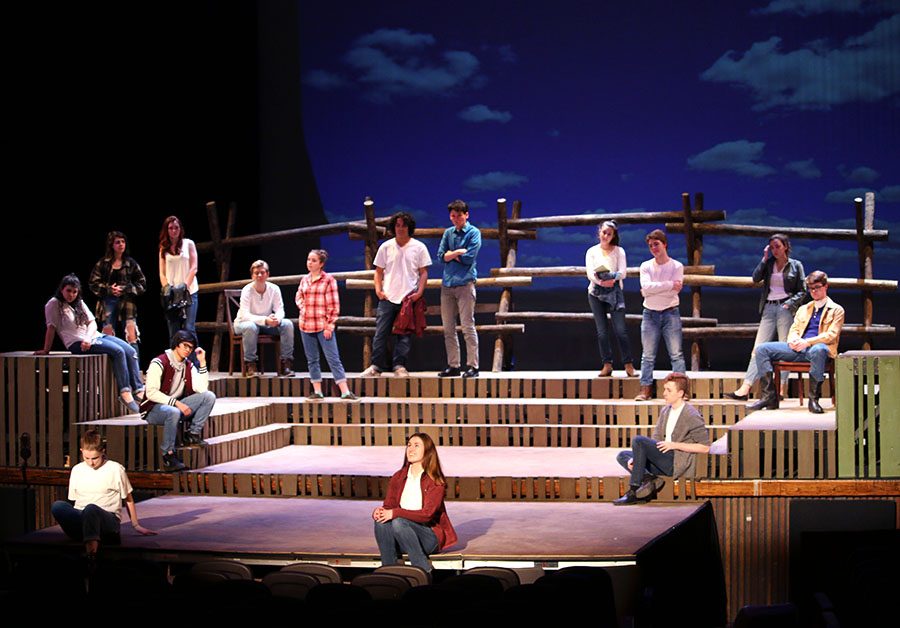
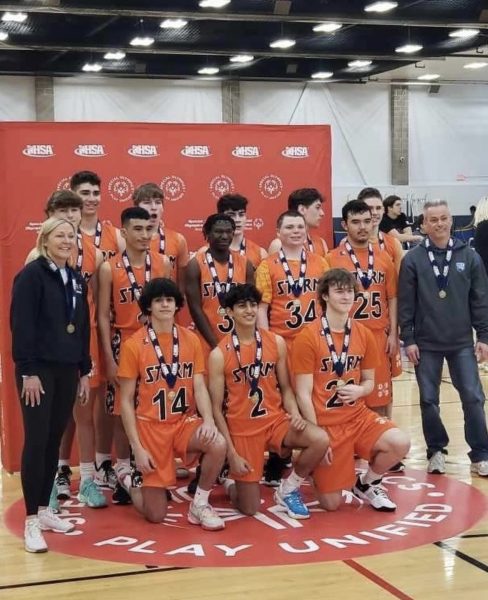
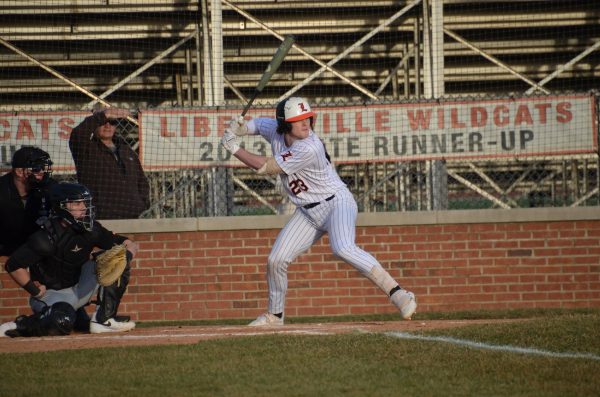
![For the final piece, a combination of Symphony Orchestra and Wind Ensemble played an extravagant song by Paul Hindemist. Flute soloist Dakota Olson had her moment highlighted within this song. “[My solo] was definitely challenging but it was fun too,” Olson said.](https://www.lhsdoi.com/wp-content/uploads/2024/03/amy-and-joey-shot-600x400.jpg)
